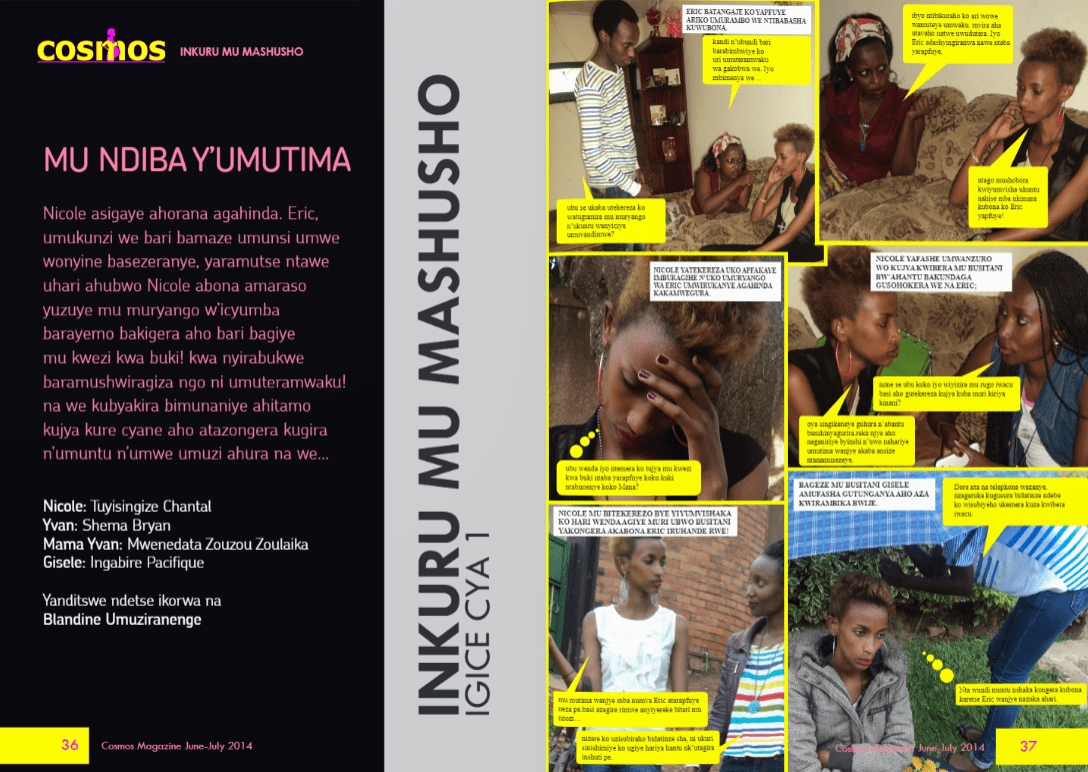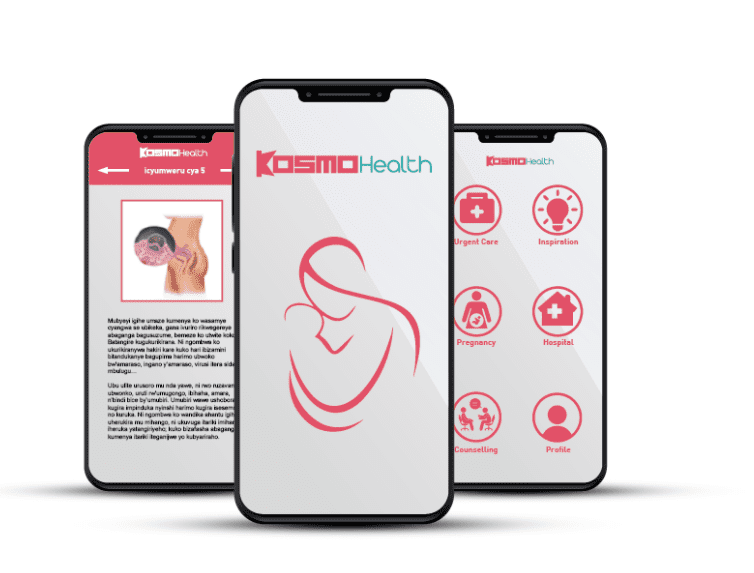by Bea Spadacini
There are no roadmaps for learning how to be a good parent. Experience is what matters. However, information and timely advice from fellow parents and pediatricians can certainly help. So, when Blandine Umuziranenge decided to launch Cosmos Magazine in Rwanda back in 2014, her initial focus was to create a publication for soon-to-be mothers, breastfeeding women, and their spouses.
When naysayers challenged her by saying that parenting cannot be taught, especially by someone who is not a mother herself, Blandine was unapologetic. “Even though I am not a parent yet,” she would reply, “I have been parented myself, and I know the difference between good and bad parenting.”
Blandine was not just speaking about her personal experience, but also about what she witnessed as a four-year-old child when, during the Rwandan genocide of 1994, she spent time with her family in a refugee camp in the Democratic Republic of Congo, and later in Uganda.
“I was too young to go to school so, I stayed in the camp and tagged alongside the women. Many of them were pregnant but suffered complications during delivery and lost their babies.” She also saw many children who were growing up alone in the camps without any parental guidance or direction.
These childhood experiences fueled her passion for helping pregnant mothers and children. Years later, after completing a dual degree in IT and business, she decided to launch Kosmotive, a social enterprise that seeks to improve maternal and child health in Rwanda and throughout Africa. The magazine was the first of many endeavors to come.
“One of the most popular features of the magazine, were the photo stories,” explains Blandine. “But we soon realized that even though readers loved them, they were not sustainable. Making and printing them was simply too costly. That is when I decided to go digital and I launched the KosmoHealth app. My vision is to offer accurate health information and connect our users to mobile health services.”

Blandine and her team are already on the third iteration of the KosmoHealth App, which they recently presented in a digital innovation webinar organized by the Health Journalism Network. They are waiting for final approval from the e-health department of the Rwandan Ministry of Health. “We now have more than 3,000 active users on the app who engage with us regularly, call into our health line, and suggest topics. With the official approval, the Ministry could recommend our app to all pregnant women who visit a hospital.”
The app, like the magazine, is free. Their sponsors come from the private sector. During the pandemic, they also received the Information Saves Lives Rapid Response Fund from Internews to support their digital platform.

Aware of the high illiteracy rates among rural women and the digital gender divide that exists in Rwanda, Blandine does not rely on the app alone to reach women and girls. As a social enterprise, Kosmotive also sells sanitary pads and a line of clothing for pregnant and breastfeeding mothers.
The idea of manufacturing sanitary pads came to Blandine when she took an online course on creative writing and had to write a 1500 words essay. “I did not know where to begin until my mentor told me to write something personal, which is exactly what I did. I wrote about the struggles I faced when I had my first period. My parents had not prepared me, and I did not know what to do. I was terrified. Through my research, I realized that I was not alone. According to data shared by the Sustainable Health Enterprise, 18 percent of women and girls miss out on school or work because they cannot afford to buy menstrual pads. Apart from issues of health and dignity, that’s a potential GDP loss of $215 per woman every year in Rwanda – all because of a lack of access to menstrual pads.”
That self-awareness led to a new adventure, now a core pillar of Kosmotive. Girls who have dropped out of school or who come from low-income families, are offered jobs to make reusable sanitary pads. While earning an income, they learn about various reproductive health topics. “As the girls produce these pads, we provide them with education and life skills about pregnancy and how to be good parents,” says Blandine. She adds that in Rwanda, like in many other countries across Africa, parenting is taken for granted with sometimes negative consequences for children.
“Before the pandemic, we held KosmoParenting sessions,” explains Blandine. “We created a safe space for parents to come together and share their experiences. We also brought in counselors and pediatricians. Parents often feel bad because they think they are not doing enough for their children. Together, they find community.” While this activity has been temporarily put on hold due to COVID-19, the need for this type of information in Rwanda is gradually being recognized.
“As long as I am serving the people I need to serve; I don’t have to be trapped in a specific sector. I will do anything to improve women’s health. My why is what drives me.”
When Blandine started the magazine, her journalist friends told her that the focus on parenting was too narrow for the publication she was launching. While the magazine continues to cover issues related to motherhood, it also touches on other women’s health issues, including nutrition, violence against women, and now COVID-19. Access to information is augmented through the app, a health helpline with a dedicated staff, and the face-to-face workshops.
The evolution of Kosmotive reflects the evolution of Blandine the entrepreneur. “More than once I was told by family and friends to focus on one thing only,” she says. In 2018, Blandine got accepted into a competitive post-graduate program on social innovation management in India. This is what she got out of that program: “As long as I am serving the people I need to serve; I don’t have to be trapped in a specific sector. I will do anything to improve women’s health. My why is what drives me.”